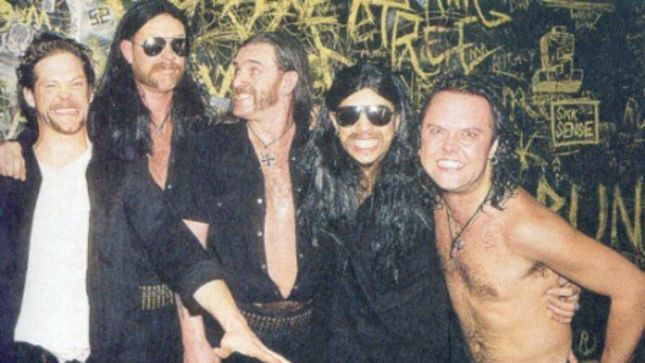
The monstrous wave of accolades and tributes to Motörhead legend Lemmy Kilmister, who passed away on December 28th at the age of 70, continues with a lengthy message written by Metallica drummer Lars Ulrich:
“Lemmy is probably one of the absolute primary reasons that I wanted to be in a band. It’s that simple. I got introduced to Motörhead’s music in 1979, when Overkill came out. I was in a record store and the double bass intro to “Overkill” started, and I never heard anything like that in my life. The subsequent ride that this music took me on was to a place I had never been. It was really exciting and really invigorating. It felt fresh and different.
I became pretty obsessed with them for the better part of the next few years after that. The first time I saw them was in the spring of 1981, when they were supporting Ozzy, who was kind of breaking as a solo artist, and Motörhead was opening. So this was obviously an incredible bill, but for me to get a chance to finally experience Motörhead … So me and my friend Richard Burch — whose name is immortalized on the back of Kill ‘Em All for saying ‘Bang the head that doesn’t bang’ — him and I followed Motörhead around California: San Diego, Los Angeles, San Francisco and they also played one of their own shows at the Country Club in L.A.
Getting a chance to see them that often was an amazing thing, but more so, we actually got really close to them. We got a chance to meet them and hang out with them. And that’s because of Lemmy and his graciousness. He was so open and approachable, so the antithesis of a rock star; he wasn’t full of shit or unapproachable, hiding behind masks or whatever. None of that existed. He had this presence and this aura of all the great rock stars of the Sixties and Seventies, but at the same time, he was this incredible down-to-earth, easygoing, easily approachable guy. So me and my friend Rich were just hanging out and we ended up in the back of the bus drinking beer, hanging out, listening to tall tales and wild tour stories and being a part of all the shenanigans that followed a rock & roll tour around at that time. It left a deep impact on me, because rock stars up until that time seemed to come from someplace else. They were larger than life; you weren’t on the same level as them. You weren’t worthy. You couldn’t even picture yourself even engaging with Robert Plant or Paul Stanley, Elton John or Rod Stewart.
Lemmy was this guy that made all of that possible. It was the first time I really experienced that. Me and Rich were driving behind Motörhead’s tour bus, following them up and down Interstate 5 for the better part of a week. They’d pull into a truck stop, and we would pull into a truck stop. Should we go up and say hi to them? Should we keep clear? It was all funny and weird, but over the course of this week, we got to know Lemmy and realize that we didn’t have to try and act super cool and hide our fanboy nerdism. He opened up the door and let us in, and that was just a mindfuck because it wasn’t how the rules were at that time.
So when I say that Lemmy is the primary reason that I’m in a band to this day, and that Metallica exists because of him, it’s not some cheap exaggeration. It really was. They took me in, they let me be a part of what they were doing, and it inspired James and I to form this band based on that kind of attitude and that kind of aesthetic of engaging with your fans and being open and transparent and letting people in and sharing the experience. We were all just a bunch of lost fucking kids who wanted to belong to something that was bigger than ourselves.
That was what Motörhead represented: You were a part of a gang. If you were a Motörhead fan, you were called a Motörheadbanger — the Motörheadbangers was the name of their fan club — and we all had a common connection where we felt like we all belonged. We felt like we were belonging to something that was greater than ourselves. But there was no separation between band and fans. There was no separation between anybody; we were all just in it together. It was so fucking inspiring. That unity made me just want to be in a band and be part of that collective and do my own version of that experience. Deep ingrained in us is that aesthetic that comes directly from Lemmy and from how he took me under and let me into his inner sanctum for that summer in 1981. I’ll forever be indebted to him and forever grateful.
I was down at the 70th party two weeks ago, and I got a chance to sit with him for about 10 minutes, just him and me. I told him it was his obligation to the rock & roll community to live forever, because he was the reason we could all get together and celebrate hard rock and celebrate Motörhead and see familiar faces because we’re all so scattered now. His birthday party was like a hard-rock class reunion. Everybody was there because Lemmy’s one of the few people we can all agree on who is just the coolest guy ever. We would all show up.
Obviously I could tell that he was in deteriorating health but we had a close bond, one that didn’t necessarily need to be reaffirmed or articulated. The less we said the more we knew the connection was there.
Whenever Metallica played L.A., he would always come and watch us, and whenever Motörhead was up here, we’d always go and see them play. We probably crossed paths 50 to 100 times in the last 20 years, and he came and played with us onstage multiple times. It was a bond that deep and it goes back to the crazy summer of 1981. I will always appreciate and forever cherish all the great times we had together, but especially those early days. We were so vulnerable, so moldable because a significant part of who we’ve become, both in the band and as people, is directly due to not just him but all the rest of the people who were inspired and drank from the same bottles and shared the same stories and same space. His spirit will always live in us.”
As with Ozzy Osbourne’s tribute to Lemmy, found here, this is an abbreviated version of Ulrich’s complete post. Go to this location for Ulrich’s full tribute.
![]()
Fonte: Bravewords.com











